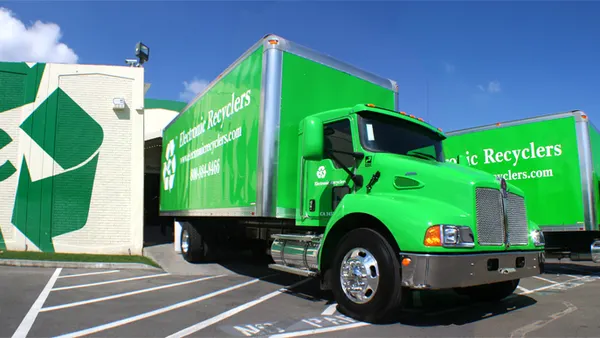UPDATE: At an April 3 meeting, the Des Plaines City Council voted unanimously in favor of a resolution expressing their opposition to the proposed Patriot Acres compost facility, as reported by the Des Plaines Journal. The resolution questioned the project's zoning qualifications and potential community benefit.
"[The] City Council has determined that the Facility could have a detrimental impact on the residents of the City as a result of increased truck traffic, disease vectors like birds and rodents, airborne particulates, and odors generated by the Facility..." read the resolution.
While this could have an effect on the Cook County zoning board's decision, it is not binding. Patriot Acres plans to host the first of multiple community meetings this month to further discuss residents' concerns and a final county decision isn't expected until at least June.
Dive Brief:
- Patriot Acres LLC has decided to delay its plans for a 25-acre composting facility near Des Plaines, IL, a suburb of Chicago, to schedule more public meetings and attempt to reduce community opposition to the plan. Odor had been the main concern among local residents, as reported by the Chicago Tribune.
- The company plans to accept yard waste and a small portion of pre-consumer food, such as fruits and vegetables. In an effort to mitigate odors, their plans call for the staging and mixing area to be under cover, the aerated static pile system to be situated on pads with positive draft pressure, the use of a biofilter layer and the installation of other monitoring equipment.
- Patriot Acres had aimed to be operational by the end of the year, but that timeframe may now be pushed back. They had already received the necessary clearances from Cook County's zoning board and will now wait to apply for the remaining county and state permits until after the meetings are held.
Dive Insight:
This project checks many of the boxes that developers and communities like to see. It would be located on a former landfill site, with close access to transportation arteries and viable local markets for the finished compost. The remainder of the 167-acre site would be used for community gardens, urban farming and greenhouses. Partnerships would be developed with the Archdiocese of Chicago and local community college to take material and provide compost. Internship and employment opportunities would also be developed in partnership with the college.
Yet even with all of these selling points it can be difficult to convince local residents that odor mitigation is possible. Sometimes all it takes is one bad day, or stories of issues at other facilities in the country, to turn people off from the idea. Experts in the field say that in addition to using the best technical practices, ongoing community engagement is often the most successful way to address these concerns. Patriot Acres seems to have recognized this by calling for more meetings.
In addition to convincing residents that odors can be managed effectively, another tactic may be to educate them on the benefits of organics diversion. This has recently become a higher priority in the region and has previously been established as a federal priority as well. Unlike some other states, Illinois doesn't have imminent landfill capacity issues though in the future the financial realities of increasing export costs may help convince residents if nothing else does.











